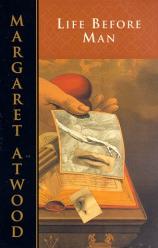Reading Group Guide
Discussion Questions
Life Before Man

1. Of the novel's three narrators, whose voice do you find the most compelling? The most reliable? Sympathetic? Whose story is this? What might be Atwood's purpose in offering us three protagonists?
2. Suicide--considered, attempted, and committed--is the specter that haunts this novel. Chris, Caroline, Elizabeth's mother, Nate's mother, Martha, Lesje, and Elizabeth each consider, if not act on, suicidal impulses. Discuss the role of suicide in the novel. What are its repercussions and consequences?
3. Anton Chekhov has written of his own work that "I have not introduced a single villain nor an angel, although I could not refuse myself buffoons." Consider this statement in light of this novel: Who are the buffoons? Has Atwood created any angels? Villains?
4. Throughout the novel, Elizabeth is the character most likely to take control of situations and instigate change. Yet when her marriage is on the verge of collapse, Elizabeth refuses to leave, forcing Nate to make the ultimate break. Why does she choose to be abandoned rather than leave? Is there power behind her seeming powerlessness? Action in her refusal to act? What do you make of her strategies?
5. Consider the "phone tree" that exists between Elizabeth, Martha, Lesje, and Nate's mother. What purpose does it serve? How does the phone tree affect Nate? Does his awareness of its existence change his actions? The nature of his relationship to each of the women?
6. Does Atwood ever take a moral position during the course of the novel? Where do you think her sympathies lie? Where do yours? Do they change as the novel progresses?
7. Lesje often reiterates her fear that she is disappearing and becoming a cipher. At these times, she retreats into her dinosaur fantasies. What does her dinosaur world offer her that her real life can not? What catalyzes her inability to conjure up her fantasy world? How do you interpret this cessation?
8. "It's hard to renounce tribute from those who once willingly paid it; hard not to exact," muses Elizabeth. Throughout the novel, parents and children, husbands, wives, and lovers all strive to alternately renounce and exact love, duty, and forgiveness from one another. Can such elusive emotions withstand commodification? What happens as a result?
9. Atwood inserts several instances of sex-related violent activity: William's rape of Lesje, Elizabeth's frantic sex with the underwear salesman, and Martha's beating of Nate. What is the purpose of these interludes? What impact do they have on the characters?
10. Elizabeth is devastated to learn that her mother, during a time of hardship, essentially sold her and her sister Caroline to Auntie Muriel. Yet Elizabeth and Nate find themselves similarly jockeying their daughters between them during the course of their separation. How does the divorce take its toll on the family? How and why does Elizabeth's relationship to her daughters change? How does Nate's? Lesje's?
11. "It's hard to believe that such a negligible act of hers can have measurable consequences for other people . . . [Lesje]'s not used to being a cause, of anything at all." Among her characters, Atwood sets a veritable Rube Goldberg machine of action and consequence, cause and effect into motion. What becomes of each characters' free will and choice when each of their actions irretrievably affects the lives of others?
12. Discuss the use of paleontology as on ongoing metaphor throughout the novel, and its parallel to the evolution of familial and romantic relationships.
Life Before Man
- Publication Date: April 13, 1998
- Paperback: 384 pages
- Publisher: Anchor
- ISBN-10: 0385491107
- ISBN-13: 9780385491105







